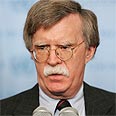
US: We won't hold direct talks with Syria
American Ambassador to United Nations John Bolton accuses Syria of assisting Hizbullah, handling spies in Lebanon; Washington seeking fundamental solution of Lebanon, will reject partial solutions, he says
United States rejects Syrian offer for talks: In response to remarks to Reuters by Syrian Deputy Faisal al-Meqdad that Syria is ready to hold talks with the United States to find a solution to the crisis between Israel and Hizbullah, the Americans said they prefer to mediate through Egypt and Saudi Arabia.
"Syria doesn't need dialogue to know what they need to do," US Ambassador to the United Nations John Bolton told Fox News Sunday.
"They need to lean on Hizbullah to get them to release the two captured Israeli soldiers and stop the launch of rockets against innocent Israeli civilians," Bolton said.
Al-Meqdad told Reuters that his country is interested in negotiating an end to the conflict between Israel and Hizbullah with the Bush administration.
Bolton accused Syria of aiding Hizbullah and continuing to operate agents in Lebanon, actions that violate UN Resolution 1559.
Ahead of the arrival to the region on Monday of US Secretary of State Condoleezza Rice, Bolton said his country is seeking a long-term solution for Lebanon.
He said a partial solution will be disastrous as it will leave a weakened Lebanese government and stronger Hizbullah. He said Rice will focus on ways to help the Lebanese government impose its sovereignty across the whole country, including the south.
Bolton said it is too early to talk about an international force that will help the Lebanese army control the south, saying his country is not interested in extending the mandate of UN observer troops in south Lebanon because their mission has failed.
Saudi talks in Washington
President Bush will meet Saudi Foreign Minister Saud al-Faisal and Prince Bandar bin Sultan, chief of the Saudi National Security Council, at the White House on Sunday evening.
The sides will discuss a humanitarian aide package to assist Lebanon. But behind the curtains the Americans and Saudis will discuss ways to coerce Syria to abandon its alliance with Iran and stop supporting Israel.
The Saudis are worried, like the Egyptians and Jordanians, by Iran's rising influence in the region and its manipulation of Hizbullah to hinder peace efforts between Israel and the Palestinians.
Merkel calls for ceasefire
Meanwhile German Chancellor Angela Merkel called for an end to the violence in the Middle East, saying in an interview released Sunday that the United Nations Security Council was the key to finding a permanent solution.
Merkel said Germany would support humanitarian efforts in the region as well as participating in international diplomatic efforts, but said she saw no need for Germany to take part in a peacekeeping force.
"At the moment, I can't see that," Merkel told ZDF public television in an annual interview to be broadcast later in the day.
"I think our interest is, firstly, that the Lebanese government be strengthened, and that we grant humanitarian help to reduce the suffering of the people there, so that what has been destroyed can be rebuilt," Merkel said.
"But that we step into an acute conflict, at the moment I don't see that as necessary."
AP contributed to this report










